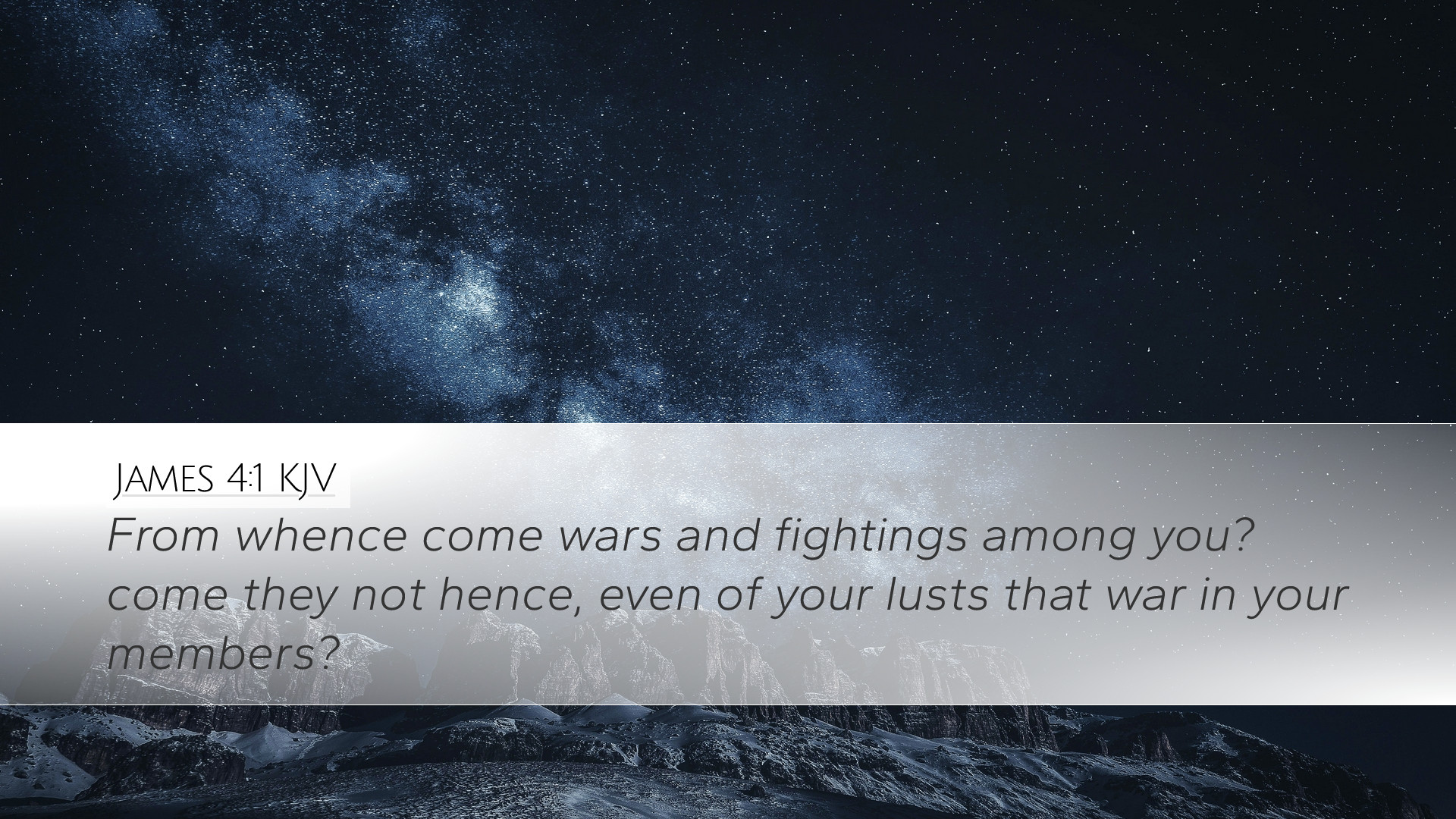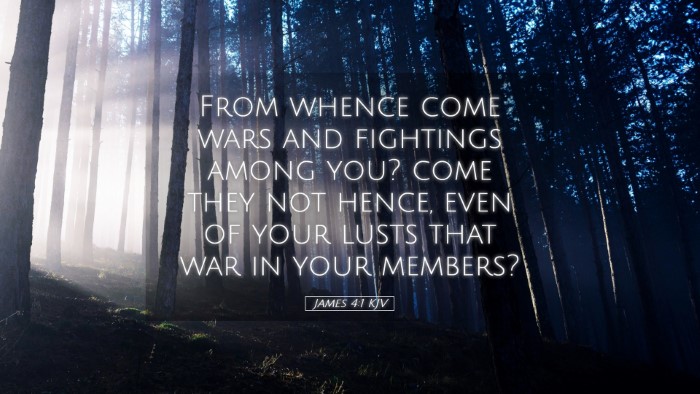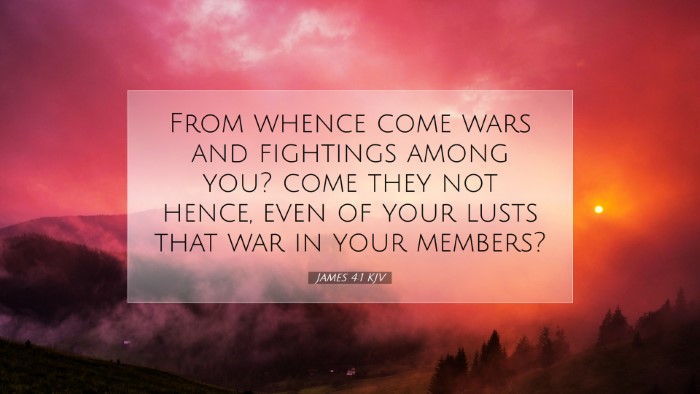Old Testament
Genesis Exodus Leviticus Numbers Deuteronomy Joshua Judges Ruth 1 Samuel 2 Samuel 1 Kings 2 Kings 1 Chronicles 2 Chronicles Ezra Nehemiah Esther Job Psalms Proverbs Ecclesiastes Song of Solomon Isaiah Jeremiah Lamentations Ezekiel Daniel Hosea Joel Amos Obadiah Jonah Micah Nahum Habakkuk Zephaniah Haggai Zechariah MalachiJames 4:1
James 4:1 KJV
From whence come wars and fightings among you? come they not hence, even of your lusts that war in your members?
James 4:1 Bible Commentary
Commentary on James 4:1
Verse Text: "What causes quarrels and what causes fights among you? Is it not this, that your passions are at war within you?" (James 4:1, ESV)
Introduction
The book of James, often considered a manual for practical Christian living, addresses the realities of faith and conduct in a manner that is both challenging and enlightening. In James 4:1, the apostle James lays bare the internal conflicts that lead to external disputes, indicating that the source of discord lies not in the actions of others but in the hearts of individuals. This commentary delves into the layers of meaning within this verse, drawing insights from established public domain commentaries.
Contextual Overview
James is writing to Jewish Christians who are experiencing trials and tribulations. The early church faced external pressures and internal strife, and James addresses these issues with wisdom and pastoral care. The context of James 4 highlights the consequences of unchecked desires and the need for humility and submission to God.
Analysis of Key Terms
- Quarrels and Fights: These terms refer to interpersonal conflicts that disrupt community life. Matthew Henry suggests that such conflicts arise from a failure to live in peace and harmony.
- Passions: The term "passions" is interpreted as desires or lusts that wage war within an individual. Adam Clarke emphasizes the destructive nature of uncontrolled desires, leading to conflict.
- War: The metaphor of war signifies a deep-seated struggle within the heart. Albert Barnes points out that this battle often manifests in visible strife with others.
The Nature of Conflict
James points to a fundamental truth: the conflicts and disagreements that arise among believers are rooted in internal struggles. The passions that wage war within us can lead to envy, strife, and division. This teaching aligns with the broader biblical narrative that emphasizes the heart's role in human behavior (see Proverbs 4:23).
Source of Quarrels
Matthew Henry highlights that quarrels and fights stem from selfish desires and ambitions. Christians may seek personal gain or recognition at the expense of unity, leading to discord. The implication is clear: when believers prioritize their desires over the community, conflict is inevitable.
Consequences of Internal Warfare
The war of passions leads not only to division but also to a breakdown in the love that should characterize the body of Christ. Adam Clarke notes that unchecked desires can result in actions that harm others, reflecting a failure to live according to the Spirit's guidance (see Galatians 5:17-21).
Theological Implications
This verse invites reflection on the nature of sin and the Christian life. The struggle within highlights the need for sanctification—a process by which believers are transformed and empowered to overcome sinful desires. It reinforces the necessity of reliance on God's grace for victory over internal temptations.
Call to Humility
In the broader context of James, the call to humility becomes paramount. James 4:6 emphasizes that God gives grace to the humble, suggesting that recognizing one's internal battles is the first step towards resolution. A humble acknowledgment of our struggles allows for healing and reconciliation, both personally and communally.
Application for the Church
James 4:1 serves as a poignant reminder for church communities to reflect on the internal motivations behind conflicts. Pastors and leaders are encouraged to foster environments where honesty about struggles with desires can be shared and addressed collectively.
Fostering Peace
Creating a culture of peace requires intentional discipleship that addresses the heart. Congregations should be encouraged to cultivate relationships marked by grace, understanding, and forgiveness, helping each member to navigate their inner conflicts appropriately.
Encouragement in Struggle
For students and scholars, this verse is an invaluable study on the human condition and the nature of sin. It emphasizes the need for both theological reflection and practical application, revealing how internal conflicts impact relationships.
Conclusion
James 4:1 calls each person to introspection and accountability. By understanding the origins of conflict as rooted in internal desires, believers are better equipped to pursue peace and unity. The insights from Matthew Henry, Albert Barnes, and Adam Clarke, when synthesized, provide a multi-faceted view of this verse, urging the body of Christ to engage in continual self-examination and reliance on God's transformative work.


